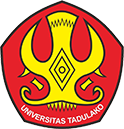COMMUNICATION PROCESS IN IMPLEMENTING THE HOPE FAMILY PROGRAM (PKH) IN MUSI RAWAS DISTRICT, SOUTH SUMATRA PROVINCE
DOI:
https://doi.org/10.22487/ejk.v10i3.778Keywords:
PKH, Policy Evaluation, Policy ImplementationAbstract
This research aims to evaluate the Family Hope Program in subdistrict. Megang Sakti, regency Musi Rawas. The Family Hope Program to reduce poverty in Indonesia through social assistance received directly by beneficiary families. This type of research is descriptive qualitative, collecting data using interview and observation techniques on informants selected through purposive sampling techniques. Data analysis was carried out by data reduction, data presentation and conclusion drawing/data verification. The results of this study concluded that the implementation of the Family Hope Program was in accordance with the provisions that had been set. Internal supporting factors include the availability of an adequate budget and being able to meet the specified quota. The internal inhibiting factor is the lack of human resources implementing the Family Hope Program. External supporting factors are regional stakeholders such as district, village governments, community health centers and schools who maximally help the smooth implementation of the program. External inhibiting factors are the area and the number of villages that do not match the number of human resources supporting the Family Hope Program







